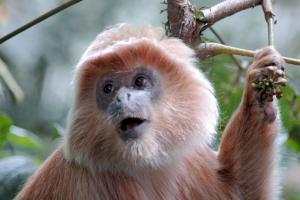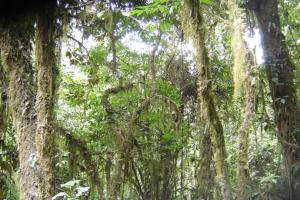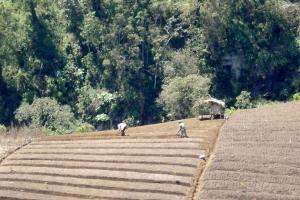Press Release: ProFauna Demands Government’s Practical and Political Efforts to Save Forests in Java
 (01/06/2010) Forests in Java Island, Indonesia, degrade which threat human and other living things on the Island, especially wildlife endemic to Java. Based on the deforestation pace published by the Forestry Department for 2003-2006 period, the largest deforestation happened in Sumatera which was 268,000 hectares/year or 22,8% of the total deforestation in Indonesia which was 1.17 millions hectares/year. The next places were in Kalimantan for 239,000 hectares/year (20.4%), Sulawesi for 114,700 hectares/year (9.8 %), and Java for 2,500 hectares/year (0.2%).
(01/06/2010) Forests in Java Island, Indonesia, degrade which threat human and other living things on the Island, especially wildlife endemic to Java. Based on the deforestation pace published by the Forestry Department for 2003-2006 period, the largest deforestation happened in Sumatera which was 268,000 hectares/year or 22,8% of the total deforestation in Indonesia which was 1.17 millions hectares/year. The next places were in Kalimantan for 239,000 hectares/year (20.4%), Sulawesi for 114,700 hectares/year (9.8 %), and Java for 2,500 hectares/year (0.2%).
Despite the small number of deforestation in Java, the remaining forests in the island are very small too. Java as an island with the highest density in Indonesia, its forests are not well taken care of. In fact, forests in Java are inhabited by so many endangered species which are endemic to island. Such animals like the Javan Hawk-Eagle, Javan gibbon, Javan langur, slow loris, surili, Javan rhinoceros, and many more, will get extinct if Javan forests as their habitats decrease.
 Deforestation in Java also increases wildlife poaching. Especially the deforestation in East Java, where there still can be found the endemic and endangered yet lucrative species. According to ProFauna's records, wildlife poaching or hunting still happens in the areas of nature conservation like in R Soerjo Grand Forest Park (locally known as Tahura R Soerjo) and Merubetiri National Park. Lack of protection by the authorities where poachers and hunters can easily access the forests is one of the main causes of the deforestation in the areas.
Deforestation in Java also increases wildlife poaching. Especially the deforestation in East Java, where there still can be found the endemic and endangered yet lucrative species. According to ProFauna's records, wildlife poaching or hunting still happens in the areas of nature conservation like in R Soerjo Grand Forest Park (locally known as Tahura R Soerjo) and Merubetiri National Park. Lack of protection by the authorities where poachers and hunters can easily access the forests is one of the main causes of the deforestation in the areas.
Radius Nursidi, Forest Campaign Officer of ProFauna Indonesia, stated, "Indonesian government should take practical and political actions to save the remaining forests and wildlife in Java Island. The authorities should set up security posts in the exit points of the nature conservation areas". ProFauna's records show that there are no security posts at the exit points where anyone especially poachers can easily access the areas.
It is estimated, by using the last deforestation pace for 2007-2010 period, that the remaining forests in Java Island is 10,000 hectares. This figure shows how threatening the forest condition towards human and wildlife in Java Island is. Furthermore, the Forestry Department estimation showed that the largest deforestation in Java Island happens in East Java for 438.1 hectares/year consisting of primary forests for hectares/year (5,7%), secondary forests for 43.6 hectares/year (9,9% ), and the other forests for 369.5 hectares/year (84,3%). However, ProFauna believes that the actual deforestation in East Java is larger than the figures presented by the government.
People Engagement to Save Forest
 Based on the data presented above, ProFauna learned that forest problem is not only government's task but people should also be involved to solve it. The organization proposes that one way of people engagement is through reforestation by people or community based reforestation especially by applying correct seedling, planting, and reforestation. So often, reforestation is carried out without sustainability consideration. Thus, ProFauna suggests that the reforestation should plant seedlings which can produce fruits without cutting of the trees.
Based on the data presented above, ProFauna learned that forest problem is not only government's task but people should also be involved to solve it. The organization proposes that one way of people engagement is through reforestation by people or community based reforestation especially by applying correct seedling, planting, and reforestation. So often, reforestation is carried out without sustainability consideration. Thus, ProFauna suggests that the reforestation should plant seedlings which can produce fruits without cutting of the trees.
For this reason, on 10 January 2010, ProFauna held reforestation on the foothills of Kawi Mountain by planting 2,000 jackfruit seedlings. Villagers around the foothills can harvest the fruits but should not cut off the trees.
Government Policy on Deforestation
Indonesia is infamous as a country with the fastest deforestation pace in the world. Deforestation in the country is caused by illegal logging, forest conversion for plantation and mine, as well as forest fire.
 Government has run many ways to stop the deforestation, but they don't go along with other forestry policies. For example, President Yudhoyono's committed to reduce carbon emission by 26% in 2020 during his speech in the COP15 United Nations Climate Change Conference Copenhagen 2009. ProFauna considers that this commitment is contrary to the government policy to convert 17.91 millions hectares forest for non-forestry development areas. The paradox is also shown by the government's plan to expand the palm oil plantation for another 26.7 millions in 17 provinces by converting the natural forests.
Government has run many ways to stop the deforestation, but they don't go along with other forestry policies. For example, President Yudhoyono's committed to reduce carbon emission by 26% in 2020 during his speech in the COP15 United Nations Climate Change Conference Copenhagen 2009. ProFauna considers that this commitment is contrary to the government policy to convert 17.91 millions hectares forest for non-forestry development areas. The paradox is also shown by the government's plan to expand the palm oil plantation for another 26.7 millions in 17 provinces by converting the natural forests.
The disasters which have happened for the past few years are also the impacts of deforestation. Local farmers are the communities who are directly impacted from climate change that is furthered worsened by deforestation as they depend on seasonal climate and weather forecasts for farming.
Deforestation has created flood as well as drought, in rainy season and in dry season respectively. This means another disaster for farmers as they can't predict the season and decide the right time to plant nor to harvest as usual. Forests serving as conserver of rainfall and water supplies can no longer function.
Since forests in Java Island worsen, ProFauna demands the government to take practical and political efforts to save them. The practical ways ProFauna suggests all stakeholders to carry out are through community based reforestation and setting up security posts in the exit points of the nature conservation areas. While the political ones are government policies that go along the forestry conservation by preventing all activities converting the natural forests in the country. Forest conversion prohibition through legislation must be fully enforced as well instead of producing laws without further application.
For further information, please contact:
Swasti Prawidya Mukti
(International Affairs Officer, ProFauna Indonesia)
Email: international@profauna.net
Mobile: +62 856 369 3611
